 Petzlover
Petzlover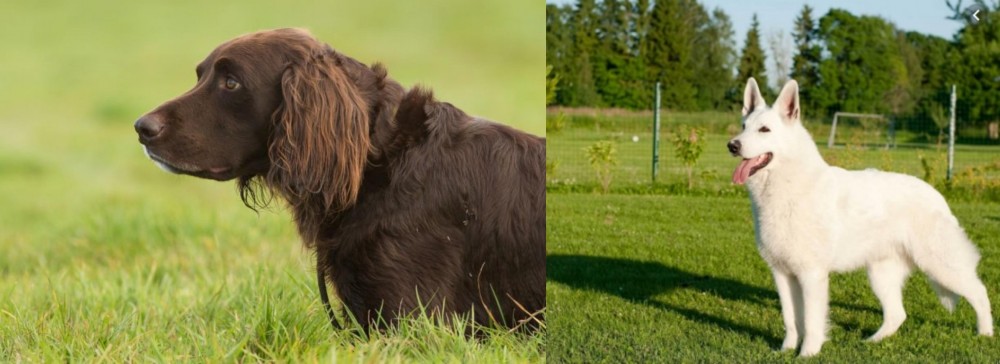 German Longhaired Pointer is originated from Germany but White Shepherd is originated from United States. Both German Longhaired Pointer and White Shepherd are having almost same height. German Longhaired Pointer may weigh 8 kg / 17 pounds lesser than White Shepherd. Both German Longhaired Pointer and White Shepherd has same life span. German Longhaired Pointer may have less litter size than White Shepherd. Both German Longhaired Pointer and White Shepherd requires Moderate Maintenance.
German Longhaired Pointer is originated from Germany but White Shepherd is originated from United States. Both German Longhaired Pointer and White Shepherd are having almost same height. German Longhaired Pointer may weigh 8 kg / 17 pounds lesser than White Shepherd. Both German Longhaired Pointer and White Shepherd has same life span. German Longhaired Pointer may have less litter size than White Shepherd. Both German Longhaired Pointer and White Shepherd requires Moderate Maintenance.
 Looking at the German Longhaired Pointer you may think that you’re looking at a type of Setter dog or even a large Spaniel. These pointing dogs, hailing from Germany, are gun dogs or working dogs, having always been used to track game.
Looking at the German Longhaired Pointer you may think that you’re looking at a type of Setter dog or even a large Spaniel. These pointing dogs, hailing from Germany, are gun dogs or working dogs, having always been used to track game.
They were developed at the end of the 19th century, as breeders were specifically looking for a dog that was faster than the wiry- and short hair German pointers. Crossing English Setters and Pointers gave breeders this German Longhaired Pointer and the dog was shown for the first time in Germany in 1879.
Known as the GLP or Deutsch-Langhaar, the dog has the bloodlines of water dogs and scenthounds, and way back In 1897, Baron von Schorlemer wrote the first standard for the German Longhaired.
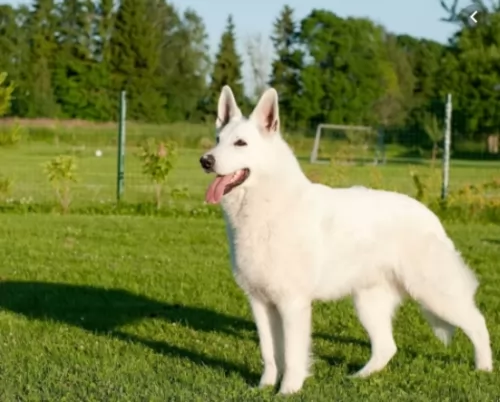 The German Shepherd and the white German Shepherd are the same dog - the only thing is that their coat colors vary.
The German Shepherd and the white German Shepherd are the same dog - the only thing is that their coat colors vary.
The White Shepherd evolved because people were looking for a working companion dog with a high degree of intelligence and a white coat.
The development of the White Shepherd began at the time of the 19th and 20th centuries. A breeding program was started but in 1933, the white coat color was made a disqualification in the German Shepherd Dog breed standard.
Not to be deterred, it was in 1969 that the U.S. and Canada formed White German Shepherd breed clubs and the breed was actually recognized by the UKC in 1999.
 Athletic and lean, the German Longhaired Pointer is a medium to large sized dog standing at 60 – 70 cm in height and weighing 25 to 32kg.
Athletic and lean, the German Longhaired Pointer is a medium to large sized dog standing at 60 – 70 cm in height and weighing 25 to 32kg.
With his webbed feet, he can move with great speed. It is why the dog isn’t suited well to life in the city really, as he has always been a dog used to working and running over large areas. He will appreciate being with an active owner.
The beautiful double coat is medium length, slightly wavy and with feathering around the legs, chest and tail. The tail itself is carried stretched outwards or kept low. It is rich brown to coppery color, while some white can sometimes be found on the chest and paws. The attractive dog has brown eyes, a black nose and ears which are long and floppy.
Intelligent, gentle and amicable the German Longhaired Pointer is an affectionate, loyal dog who is also social, getting on well with other pets in the home as well as with children.
Being the loyal dog that he is, it makes him susceptible to separation anxiety so he should never be put into the backyard and left day after day on his own.
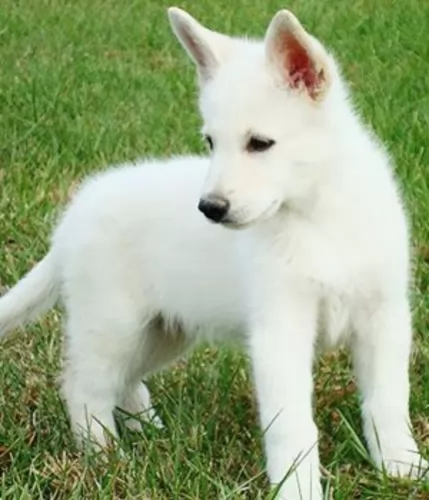 The White Shepherd is a true beauty and is a medium to large-sized dog that is muscular and strong. He stands at between 55 and 65cm in height and weighs between 35 and 40kg.
The White Shepherd is a true beauty and is a medium to large-sized dog that is muscular and strong. He stands at between 55 and 65cm in height and weighs between 35 and 40kg.
He is somewhat longer than tall. The double coat is medium length, dense, straight and white. He is a fairly heavy shedder. He has an intelligent face, a long muzzle and erect ears. The long tail is low-set.
This beautiful dog’s face tells you that he is highly intelligent. He can be easily trained. The bright eyes are eager and alert and he is ready to be an excellent guard dog and take his role as protector and guardian seriously.
The White Shepherd loves his human family and isn't overly enthusiastic around strangers. They’re playful dogs and will make great playmates for children. They also aren’t aggressive with other dogs and will get on well with other pets in the house.
 German Longhaired Pointers are calm, friendly dogs who want to please their owners. They’re really intelligent too so training and socialization won’t be difficult with this bright dog.
German Longhaired Pointers are calm, friendly dogs who want to please their owners. They’re really intelligent too so training and socialization won’t be difficult with this bright dog.
Once trained, he makes an excellent, loyal and loving family pet. With a firm, kind, consistent type of owner, the German Longhaired Pointer is guaranteed to make you a wonderful pet.
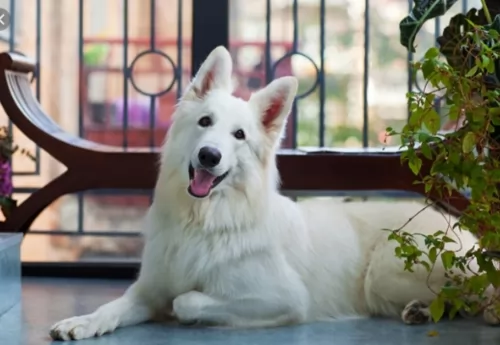 The White Shepherd is such a beautiful dog and he has some great characteristics to match his good looks.
The White Shepherd is such a beautiful dog and he has some great characteristics to match his good looks.
He is friendly and amicable with his human family and is a great protector as well. He isn’t aggressive yet he makes a great watchdog.
He is loving and loyal and forms strong bonds with his human family. Bringing him into your home and heart is guaranteed to confirm the opinion held that dogs are man's best friend.
 You’ll find that with an excellent diet and lots of love and care your German Longhaired Pointer can easily push 12 to 14 years of age.
You’ll find that with an excellent diet and lots of love and care your German Longhaired Pointer can easily push 12 to 14 years of age.
If you’re a novice dog owner, talking with your vet will give you a good idea of how to feed your dog to ensure longevity.
No matter how vibrant and energetic your pet is, there may well come a day when he is lethargic, he just wants to lie, he doesn't want to eat and he doesn’t jump up to greet you. Then it’s time for concern and to get your 4-legged friend to the vet.
There are several health problems associated with dogs that are worth researching – hip dysplasia, skin allergies, progressive retinal atrophy, allergies and cataracts.
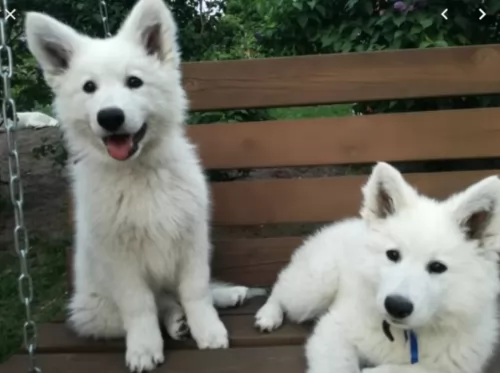 The White Shepherd shares health problems much the same as the German Shepherd, and one of these is hip dysplasia.
The White Shepherd shares health problems much the same as the German Shepherd, and one of these is hip dysplasia.
These dogs are at risk of getting hip dysplasia. It’s a congenital disorder with dogs inheriting the disease from their parents. Some young dogs can get the disease too. Because they are such active dogs, the White Shepherd is at risk of dysplasia. There are a number of signs you can look for in your dog and some of these are -
Your vet may want x-rays to examine your dog's hips. Your vet will want to slow the development of the disease and also ease the pain in your pet. There are other steps the vet will suggest to you that can make it as comfortable as possible for your pet.
 German Longhaired Pointers have the same kind of nutritional needs as all other active working or sporting dog breeds. He needs high quality food, and if you feed him a commercially manufactured food, make sure its the best and that it has minerals and vitamins for active, large breeds. Most of the dog food companies have breed-specific formulas for size, age and activity levels of dogs.
German Longhaired Pointers have the same kind of nutritional needs as all other active working or sporting dog breeds. He needs high quality food, and if you feed him a commercially manufactured food, make sure its the best and that it has minerals and vitamins for active, large breeds. Most of the dog food companies have breed-specific formulas for size, age and activity levels of dogs.
Always ensure an ongoing supply of cool, fresh water is available to him.
The coat of the German Longhair can become matted and he will require brushing at least twice a week to keep the hair free of loose hairs as well as burrs that could lead to the coat becoming untidy and tangled. The ears will also have to be watched as thick matting can occur. Also check the inside of his ears to avoid dirt and wax build up which can lead to ear infections.
General grooming will also be reqired such as checking the length of the nails if they aren’t naturally worn down. Don’t neglect his teeth and brush 2 or 3x a week with canine toothpaste and toothbrush.
Your German Longhaired isn’t a dog who likes to spend his days lying round. He is energetic and loves to be on the go. From robust ball games to rope games, running with you as you go running, swimming or cycling, this dog can’t seem to get enough exercise and will want to be included in all your activities.
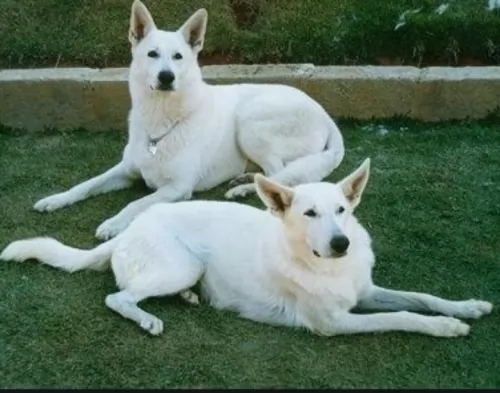 The White Shepherd's weather-resistant double coat will need to be brushed regularly as he is quite a heavy shedder. When brushing him, check for ticks and fleas as well as any unusual lumps.
The White Shepherd's weather-resistant double coat will need to be brushed regularly as he is quite a heavy shedder. When brushing him, check for ticks and fleas as well as any unusual lumps.
This beautiful dog was developed from a herding breed so he is very active. He will love a walk every day but that won’t be sufficient. He just loves ball games, and if you take him to the park, he’ll love you throwing sticks for him or the frisbee.
Because of his intelligence, he will require mental and physical stimulation. You get some toys for dogs where you can put some kibble in the toy and he has to figure out a way to get the food out.
The White Shepherd is an active dog, so to keep him that way, ensure he gets good food which has the right balance of vitamins.
There are good commercially manufactured dog foods on the market, but the idea is to know how to choose the high-quality ones and to avoid the ones that can actually jeopardize your dog’s health.
Always read the write-up on the packaging and choose according to your pet’s age and his activity levels.
It is always a good idea to give such a dog some home-made food too. Not any kind of home-made food either because you have to be careful with dogs to avoid them suffering from abdominal pain. They like their food plain and simple – boiled chicken, brown rice and vegetables.
Some raw meat occasionally is also good. Don’t forget to ensure a constant supply of cool, fresh water.